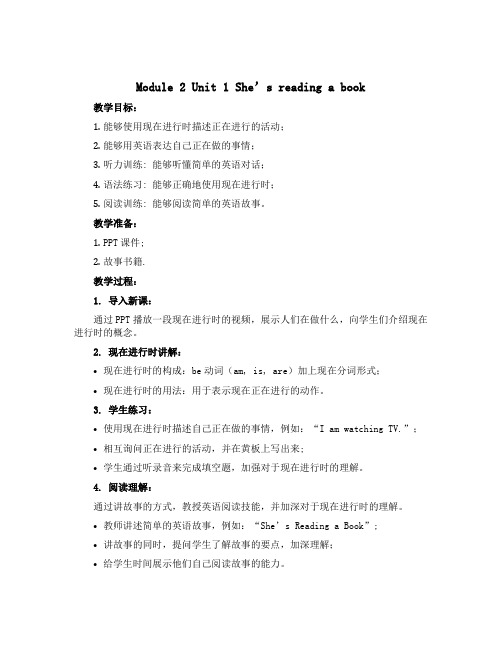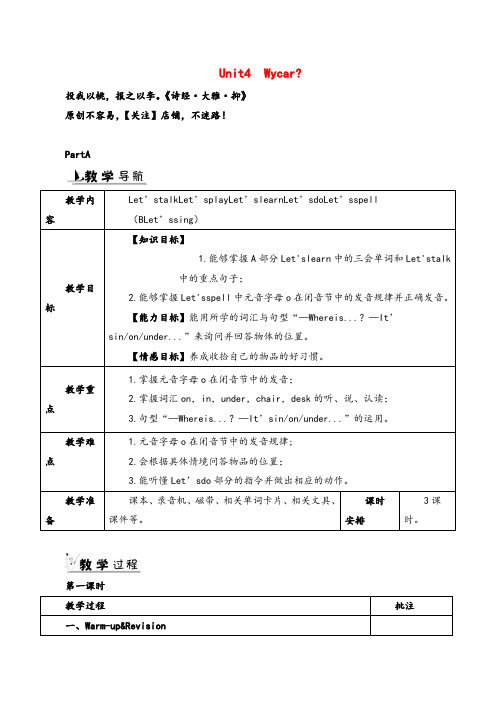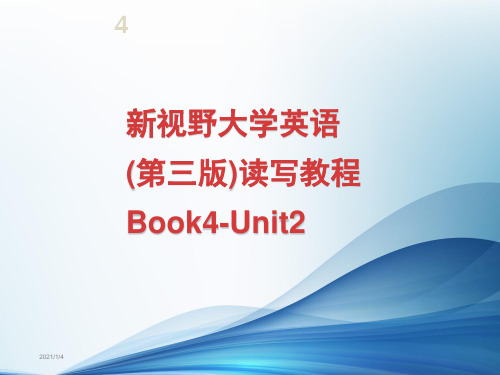Book 4 Unit 4 阅读 教案 (2)
Module 2 Unit 1 She's reading a book(教案)外研版(三起)英语四

Module 2 Unit 1 She’s reading a book教学目标:1.能够使用现在进行时描述正在进行的活动;2.能够用英语表达自己正在做的事情;3.听力训练: 能够听懂简单的英语对话;4.语法练习: 能够正确地使用现在进行时;5.阅读训练: 能够阅读简单的英语故事。
教学准备:1.PPT课件;2.故事书籍.教学过程:1. 导入新课:通过PPT播放一段现在进行时的视频,展示人们在做什么,向学生们介绍现在进行时的概念。
2. 现在进行时讲解:•现在进行时的构成:be动词(am, is, are)加上现在分词形式;•现在进行时的用法:用于表示现在正在进行的动作。
3. 学生练习:•使用现在进行时描述自己正在做的事情,例如:“I am watching TV.”;•相互询问正在进行的活动,并在黄板上写出来;•学生通过听录音来完成填空题,加强对于现在进行时的理解。
4. 阅读理解:通过讲故事的方式,教授英语阅读技能,并加深对于现在进行时的理解。
•教师讲述简单的英语故事,例如:“She’s Reading a Book”;•讲故事的同时,提问学生了解故事的要点,加深理解;•给学生时间展示他们自己阅读故事的能力。
5. 互动游戏:•学生分成小组,在白板上写出一些正在进行的活动;•学生互相猜测对方写的活动,并全部使用现在进行时来描述;•最终,老师收回白板,点评学生们表现;6. 课堂总结:通过回答问题,进一步加深学生对于现在进行时的理解。
教学反思:此次教学通过多种方式来加深学生对于现在进行时的理解。
教师讲故事,让学生了解并学会使用现在进行时;通过小组游戏加强学生对于句子的理解;最后通过回答问题,加深对于知识点的理解。
在教学过程中,应该让学生积极参与,激发学生的学习兴趣,让英语学习更有趣。
牛津译林版(2019)必修 第二册 Unit4 Welcome to the unit 教案

Book 2 Unit 4 Exploring literatureWelcome to the unit教学目标By the end of this section, students will be able to:1. list and categorize the basic knowledge of literature;2. interpret the meanings of the two excerpts in the textbook;3. share their favourite works of literature with classmates.教学重难点1. To expand one’s own knowledge of the topic of literature;2. To interpret the meanings of the two excerpts in the textbook.教学过程读种类有哪些,为接下来有关文学信息的讨论做铺垫。
Homework checkingStep 3 Before class, the teacher has asked students to surf the Internet or refer to some reference books to get someinformation about literature. Topics related to literaturemay include genres of literature, famous writers andtheir works and famous quotes, etc. Students work ingroups and report their works in the form of amind-map.引导学生自主探究总结出有关文学的基本信息,并开展小组合作,将组员收集的各种信息利用思维导图进行梳理和整合。
PEP三年级下册英语Unit 4教案(一)单元教案与反思

Unit4 Wycar? 投我以桃,报之以李。
《诗经·大雅·抑》原创不容易,【关注】店铺,不迷路!PartA教学内容Let’stalkLet’splayLet’slearnLet’sdoLet’sspell (BLet’ssing)教学目标【知识目标】1.能够掌握A部分Let'slearn中的三会单词和Let'stalk中的重点句子;2.能够掌握Let'sspell中元音字母o在闭音节中的发音规律并正确发音。
【能力目标】能用所学的词汇与句型“—Whereis...?—It’sin/on/under...”来询问并回答物体的位置。
【情感目标】养成收拾自己的物品的好习惯。
教学重点1.掌握元音字母o在闭音节中的发音;2.掌握词汇on,in,under,chair,desk的听、说、认读;3.句型“—Whereis...?—It’sin/on/under...”的运用。
教学难点1.元音字母o在闭音节中的发音规律;2.会根据具体情境问答物品的位置;3.能听懂Let’sdo部分的指令并做出相应的动作。
教学准备课本、录音机、磁带、相关单词卡片、相关文具、课件等。
课时安排3课时。
第一课时教学过程批注一、Warm-up&Revision第二课时第三课时二、Presentation&Practice1.在课件上展示盒子图片,说:“Thisisabox.”板书box并带读。
2.在课件上展示小狗在盒子里面的图片。
T:What’sthis?(用手指着小狗)Ss:It’sadog.T:Whereisthedog?Ss:It’sinthebox.板书dog并带读。
3.在课件上呈现一个橙子的图片,说:“Thisisanorange.It’sorange.”板书orange并带读。
4.教师拍拍自己的身体说:“Look!Thisismybody.”板书body并带读。
5.播放Listen,repeatandcber.部分的八个单词,提醒学生注意字母o 的发音。
剑桥国际少儿英语Book 2unit4 教案

《剑桥国际少儿英语》第二册教案
单元目标语言:
语词:mat, lamp, clock, phone, sofa, mirror, Ellie elephant, 发音/e/
结构:It’s /They’re yours/mine. Which (T-shirt)? Whose are those?
单元技能目标:
听:能够听懂谈论关于房子里的物品及其位置的对话和带有yours和mine的句子,能将字母e与/e/音联系起来说:能够谈论房子里的物品及其位置,能够利用yours和mine谈论所有物,能够识别/e/音
读:能够认读表示房子里物品的单词,能够识别用yours和mine表示所有物的句子
写:能够拼写出表示房子里物品的单词和表示所属关系的yours和mine
第一课时Lesson 1
课堂教学过程(40 mins)
第二课时Lesson 2
课堂教学过程(40 mins)
第三课时Lesson 3
课堂教学过程(40 mins)
第四课时Lesson 4
课堂教学过程(40 mins)
第五课时Lesson 5
课堂教学过程(40 mins)
第六课时Lesson 6
课堂教学过程(40 mins)。
新视野大学英语(第三版)读写教程Book4-Unit2-Section B-Making the choice to be truly beautiful

Lead-in
In my opinion, the important traits of human beauty include two types, one for appearance and one for inner qualities. Features that characterize a beautiful appearance are a goodlooking body, proper clothes and accessories, as well as the use of makeup that matches the occasion or event one is attending.
Inspiring your thoughts
The topic
1. The subject of the first sentence. Subjects are nouns (persons, places, things, or ideas).
2.
3.
A word or phrase that is frequently repeated or referred to.
What is beauty in your eyes?
They think beauty is: naturally pretty, personality, to be beautiful, to act in your own style, friendship, love, honesty, soul, inner beauty, smiling, etc. Beauty is different to everyone.
Inner qualities that make a person beautiful mainly include good manners and positive personality traits such as honesty, bravery or friendliness.
2020年新人教版《Unit 4 History and traditions》单元教案全套(附导学案)

《Unit 4 History and traditions》单元教案Unit 4 HISTORY AND TRADITIONSListening and Speaking【教学目标】1. 掌握本课的重要词汇与句式;2. 引导学生通过课内听力训练,提高听力技巧,锻炼听力水平。
【教学重难点】1. 本课时的重要词汇与句式;2. 引导学生通过课内听力训练,提高听力技巧,锻炼听力水平。
【教学过程】Step 1 Lead inLook at the photo on Page 37, and then get the Ss to ask and answer the questions.1. What do you know about the buildings in the photo?2. What traditions of that city/country do you know about?3. Why is it important to protect historic buildings and cultural traditions?Then have some Ss share their views on the questions.Step 2 Share views on historic sites1. Before listening, get the Ss to look at some photos of Qufu in Activity 1 on Page 38. And ask “What can you say about these places?”Get the Ss to discuss in groups, and then ask several volunteers to share theirviews with the class.2. Listen to a conversation between a British tourist and a Chinese student in Qufu, and then write down what they say about Confucius.Finally check the answers with the class.3. Listen again and decide whether these statements are true (T), false (F), or not mentioned (NM).(1) Listen and judge, and check the answers.1) Confucius said that learning without understanding leads to confusion.2) Xiao Kong is doing a research project on Confucius philosophy.3) As one of Confucius’ descendants, Xiao Kong’s name is recorded in the family tree.4) Dacheng Hall is the tallest building in Qufu.(2) Then go through the question as bellow, and choose the right answer.·Why do you think William said his hometown was similar to Qufu?A. There are famous halls in his hometown.B. There are no tall buildings in his hometown.C. Both places have a famous person who was born there.D. His hometown doe sn’t allow other buildings to be more noticeable than the historic buildings.4. Activity 4(1) At first, go through the Understand idioms with the Ss.An idiom is an expression which means something different from the meaning of the individual words. Some idioms present an idea or paint a picture that gives a hint as to the meaning. Other idioms can only be understood from the context in which they appear.(2) Write down the English idioms that are used in the conversation. Explaintheir meanings and think about some Chinese equivalents.5. Discuss the questions in groups, and then get some Ss to share their answers.(1) What do you know about Confuciu s’ ideas on education? Think of two or three examples. What else do you know about Confucius and his philosophy?(2) Think about a historic site that you have visited, and give an introduction to its history and importance.Step 3 Pronunciation1. Read thi s part of the poem “If-” written by British poet Rudyard Kipling.Notice the linking sounds. Then mark the linking sounds after the modelIf you can make one heap of all your winningsAnd risk it on one turn of pitch-and-toss,And lose, and start again at your beginningsAnd never breathe a word about your loss;If you can force your heart and nerve and sinewTo serve your turn long after they are gone,And so hold on when there is nothing in youExcept the Will which says to them: "Hold on!"2. Repeat the poem after the recording.Step 4 Homework课后练习Unit 4 HISTORY AND TRADITIONSReading and Thinking【教学目标】1. 理解并熟练掌握本课的重要词汇与句式;2. 引导学生通过课内阅读,了解英国的历史,全面培养学生的阅读能力和技巧。
《新视野英语教程(第三版)》教学资源book4Unit2-Section A

triumph quickly throws the apple over the fence. I run to pick it
up, holding it in my frozen fingers. In my world of death this
新视野大学英语(第三版)读写教程Book4-Unit2

Project of the unit
Why are plastic surgery so popular among those young girls? • boost one’s chances of getting a more satisfactory job; • feel more confident; • attract a more desirable spouse.
nail polish
Project of the unit
accessories
outfit
hair styles
2. Why do women care so much about their appearance? 3. In what way can people become more beautiful? 4. What do you think of plastic surgery?
2021/1/4
shapes women’s pursuit of physical beauty.
2021/1/4
Project of the unit
3. In what way can people become more beautiful? People can improve their appearance through cosmetics, beautiful dresses, accessories, hair styles, etc. Some even choose to undergo plastic surgery to change part of their face or body. As for me, a positive mind and a beautiful heart can make a person pretty.
- 1、下载文档前请自行甄别文档内容的完整性,平台不提供额外的编辑、内容补充、找答案等附加服务。
- 2、"仅部分预览"的文档,不可在线预览部分如存在完整性等问题,可反馈申请退款(可完整预览的文档不适用该条件!)。
- 3、如文档侵犯您的权益,请联系客服反馈,我们会尽快为您处理(人工客服工作时间:9:00-18:30)。
Period 1 Contents: 1. Vocabulary disorder, pack, cab, relative, arouse, admiration, admire, neighbourhood, neighbour, blindness, technically, technical, skyscraper, symbolize, symbol, mobile, suitable, suit, kingdom, Indonesian, advanced 2. Structure arrive in, packs of, struggle for, worry about, become friends with, be blessed for, not at all, translate…into…,dig into, make a decision 3. Dialogue or Reading: China in my eyes Objectives: 1. Instructional objectives (language knowledge and language skills) 1) To talk about countries and regions 2) To practise skimming and scanning. 2. Educational objectives (affect, learning strategy and cultural awareness) 1) To know China in foreigners’ eyes 2) To know the communication between language and culture. 3. Personal objectives Learn to introduce your country to foreigners and love your country. Focal points: How to introduce a country or region. Difficult points: 1)How to improve students’ reading ability 2)How to improve students’ spoken English. Procedures and Time Allotment Stage 1 Getting students ready for learning ( … mins) Step 1. Greetings Greet everyone as usual. Stage 2 Pre-stage (… mins) Step 1 Vocabulary presentation and practice disorder, pack, cab, relative, arouse, admiration, admire, neighbourhood, neighbour, blindness, technically, technical, skyscraper, symbolize, symbol, mobile, suitable, suit, kingdom, Indonesian, advanced Step 2 Structure presentation and practice (not always) arrive in, packs of, struggle for, worry about, become friends with, be blessed for, not at all, translate…into…,dig into, make a decision Stage 3 While-stage Step 1 lead in Nowadays more and more foreigners come to visit china. If you are a guide and you want to introduce your country to foreigners, what aspects will you say? resources> Task:1. How much do you know about china? Match the information in both columns. (on the screen) Task 2. make up a dialogue between a Chinese and a foreigner who is visiting China for the first time. You may use the information above. You may begin your conversation like this: A: Would you please tell me something about … B: Too much to say. China has a long and amazing history and culture… But I was most impressed by … A: Is that so? Tell me more about it. I can’t wait! B: … Step 2. fast reading 1. What are mainly mentioned in the passage? Tick the words below. people√ history and culture√ population land places of interest natural resources construction √ food 2. What’s China like in his eyes? In my eyes, China is a very big developing country… Step 3 careful reading Read the passage again and finish the exercises. 1.Read the article carefully and fill in the missing information. In the eyes of the writer, China is than other places. Chinese people are and . China is a country, with and in every corner of the streets; skyscrapers , vehicles of all sorts are Is the best decision he’s made. 2.Read the article again and answer the following questions. 1) Where do you think the writer comes from?
2) How do you understand the sentence “everyone around me was just like myself, an ordinary Chinese” in Para. 1?
3) What does “this” in line 5, Para 2 refer to? 4) What does the underlined sentence in Para. 3 mean? Give your understanding by completing the following sentence. I simply told them that 5) What does the underlined part in Para. 4 mean? Choose one answer from the following. A.I never have the interest in reading. B.I have always had the interest in reading. C.I never read because of lack of interest. 6) What does “others” in Line 4, Para. 4 refer to?
Stage 4 Post-stage (… mins) Step 1. Oral work Suppose the writer is back to his own country, and he is now talking with one of his friends about China. Role-play the following dialogue with your partner. Tina: Hi! I thought you were in china! Writer: Yes, but I came back the day before yesterday. Tina: how do you like china? Writer: oh, marvelous! … Stage 5 Assigning homework Write a letter to a foreigner to tell sth about China.
Notes for reading
1. When I arrived in Guangzhou, I was surprised by the restlessness and disorder of the people rushing in and out, carrying packs of luggage and struggling for a taxi. = Arriving at Guangzhou, I was shocked by the restlessness and disorder of the people rushing in and out, carrying packs of luggage and struggling for a taxi. 1) restlessness n. less: careless homeless fearless hopeless ness: carelessness illness happiness greatness 2) struggle vi 努力,奋斗,同……斗争(against; with; for) We must struggle against/with all sorts of difficulties. King has been struggling for the equal rights for the blacks all his life. 挣扎,奋力前进,艰难或者奋力的进行( along; through; in; on; up) The old man was struggling along the path towards the cave. The troops were struggling through the snowstorm. He struggled up and wanted to say something. n. 斗争;战斗;奋斗;拼搏;战争;费劲的事 this book was about the struggle for existence.
